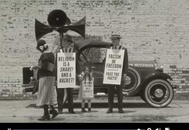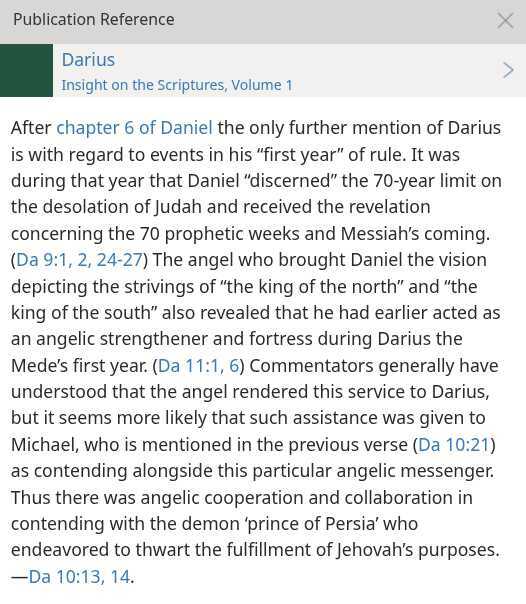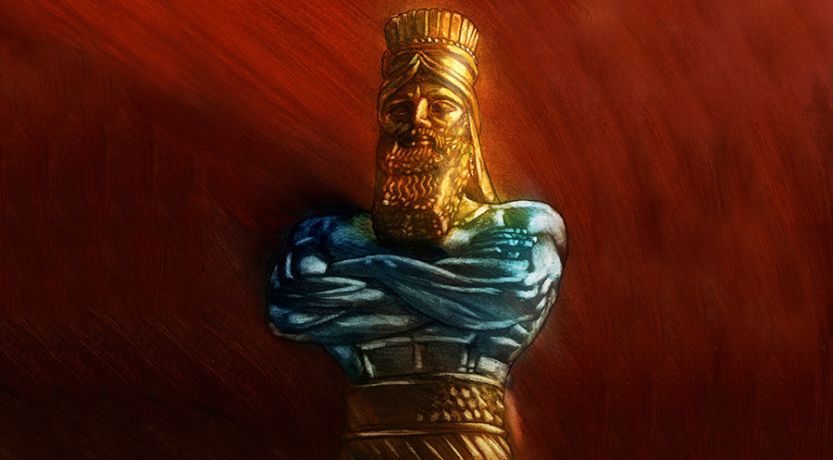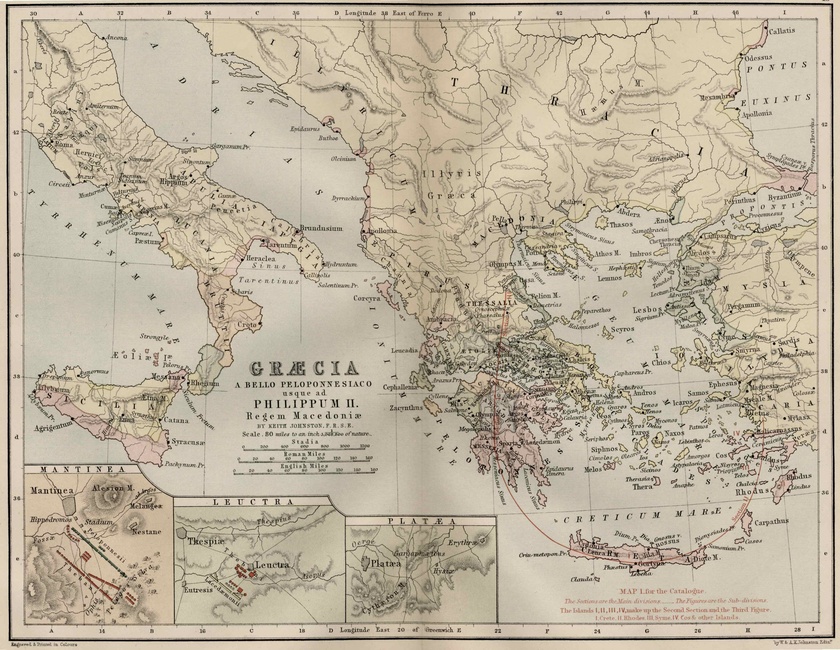Let's Learn About Daniel Chapter Eleven! PART 1 of 2 (Daniel 11:1-14)
Understanding the following beginning verses of Daniel Chapter Eleven, is Critical in understanding the prophecy, when these words were written, and when and how they were fulfilled.
Lets Learn More: Daniel Chapter Eleven 2 What I will tell you now is the truth:
11 As for me, in the first year of Da·riʹus the Mede, I stood up to strengthen and fortify him.
2 What I will tell you now is the truth:
Look! Three more kings will stand up for Persia, and the fourth one will amass greater riches than all others. And when he becomes strong by means of his riches, he will rouse up everything against the kingdom of Greece.
3 And a mighty king will stand up and rule with extensive dominion and do as he pleases.
4 But when he has stood up, his kingdom will be broken and be divided toward the four winds of the heavens, but not to his descendants and not like the dominion with which he ruled; for his kingdom will be uprooted and go to others besides these.
5 And the king of the south will become strong, that is, one of his princes; but one will prevail against him and will rule with extensive dominion, greater than that one’s ruling power.
6 After some years they will make an alliance, and the daughter of the king of the south will come to the king of the north in order to make an equitable arrangement. But she will not retain the power of her arm;
Thank You to The Watchtower Bible and Track Society, publishers of JW.org for the research material used to help see God's word more clearly.
Publication Reference
Darius
Insight on the Scriptures, Volume 1
After chapter 6 of Daniel the only further mention of Darius is with regard to events in his “first year” of rule.
It was during that year that Daniel “discerned” the 70-year limit on the desolation of Judah and received the revelation concerning the 70 prophetic weeks and Messiah’s coming. (Da 9:1, 2, 24-27)
The angel who brought Daniel the vision depicting the strivings of “the king of the north” and “the king of the south” also revealed that he had earlier acted as an angelic strengthener and fortress during Darius the Mede’s first year. (Da 11:1, 6)
Commentators generally have understood that the angel rendered this service to Darius, but it seems more likely that such assistance was given to Michael, who is mentioned in the previous verse (Da 10:21) as contending alongside this particular angelic messenger.
Thus there was angelic cooperation and collaboration in contending with the demon ‘prince of Persia’ who endeavored to thwart the fulfillment of Jehovah’s purposes.—Da 10:13, 14.
(end reference)
Publication Reference
Two Kings in Conflict
Pay Attention to Daniel’s Prophecy!
3. Whom did the angel support “in the first year of Darius the Mede”?
3 “As for me,” said the angel, “in the first year of Darius the Mede [539/538 B.C.E.] I stood up as a strengthener and as a fortress to him.” (Daniel 11:1)
Darius was no longer living, but the angel referred to his reign as the starting point of the prophetic message. It was this king who had ordered that Daniel be taken out of the lions’ pit.
Darius had also decreed that all his subjects should fear Daniel’s God. (Daniel 6:21-27)
However, the one for whom the angel stood up as a supporter was, not Darius the Mede, but the angel’s associate Michael—the prince of Daniel’s people. (Compare Daniel 10:12-14.) God’s angel provided this support while Michael contended with the demon prince of Medo-Persia.
(end reference)
THE DEATH OF Alexander The Great
Alexander’s death and the subsequent division of the empire,
4 But when he has stood up, his kingdom will be broken and be divided toward the four winds of the heavens,
THE BEGINNING OF THE KINGS OF THE NORTH AND SOUTH
5 “And the king of the south will become strong, that is, one of his princes; but one will prevail against him and will rule with extensive dominion, greater than that one’s ruling power.
Publication Reference
Two Kings in Conflict
Pay Attention to Daniel’s Prophecy!
18, 19. In the course of time, how did the two rival kings enter into “an equitable arrangement”?
(*) 6 “After some years they will make an alliance, and the daughter of the king of the south will come to the king of the north in order to make an equitable arrangement.
18 Concerning the two kings, the angel prophesied: “At the end of some years they will ally themselves with each other, and the very daughter of the king of the south will come to the king of the north in order to make an equitable arrangement. But she will not retain the power of her arm; and he will not stand, neither his arm; and she will be given up, she herself, and those bringing her in, and he who caused her birth, and the one making her strong in those times.” (Daniel 11:6) How did this come to be?
19 The prophecy did not take note of Seleucus I Nicator’s son and successor, Antiochus I, because he did not wage a decisive war against the king of the south. But his successor, Antiochus II, fought a long war against Ptolemy II, the son of Ptolemy I. Antiochus II and Ptolemy II respectively constituted the king of the north and the king of the south. Antiochus II was married to Laodice, and they had a son named Seleucus II, whereas Ptolemy II had a daughter named Berenice. In 250 B.C.E., these two kings entered into “an equitable arrangement.” To pay the price of this alliance, Antiochus II divorced his wife Laodice and married Berenice, “the very daughter of the king of the south.” By Berenice, he had a son who became heir to the Syrian throne instead of the sons of Laodice.
20. (a) How did Berenice’s “arm” not stand? (b) How were Berenice, “those bringing her in,” and “the one making her strong” given up? (c) Who became the Syrian king after Antiochus II lost “his arm,” or power?
20 Berenice’s “arm,” or supporting power, was her father, Ptolemy II. When he died in 246 B.C.E., she did not “retain the power of her arm” with her husband. Antiochus II rejected her, remarried Laodice, and named their son to be his successor.
As Laodice planned, Berenice and her son were murdered. Evidently, the attendants who had brought Berenice from Egypt to Syria—“those bringing her in”—suffered the same end. Laodice even poisoned Antiochus II, and thus “his arm,” or power, also did “not stand.” Hence, Berenice’s father—“he who caused her birth”—and her Syrian husband—who had temporarily made her “strong”—both died.
This left Seleucus II, the son of Laodice, as Syrian king.
How would the next Ptolemaic king react to all of this?
[end of reference]
6 cont'd, But she will not retain the power of her arm; and he will not stand, nor his arm; and she will be given up, she and those bringing her in, and the one who caused her birth, and the one making her strong in those times.
7 And one from the sprout of her roots will stand up in his position, and he will come to the army and come against the fortress of the king of the north and will take action against them and prevail.
Publication Reference
Two Kings in Conflict
Pay Attention to Daniel’s Prophecy!
21. (a) Who was “one from the sprout” of Berenice’s “roots,” and how did he “stand up”? (b) How did Ptolemy III “come against the fortress of the king of the north” and prevail against him?
21 “One from the sprout of her roots will certainly stand up in his position,” said the angel, “and he will come to the military force and come against the fortress of the king of the north and will certainly act against them and prevail.” (Daniel 11:7)
“One from the sprout” of Berenice’s parents, or “roots,” was her brother. At his father’s death, he ‘stood up’ as the king of the south, the Egyptian Pharaoh Ptolemy III.
At once he set out to avenge his sister’s murder. Marching against Syrian King Seleucus II, who Laodice had used to murder Berenice and her son, he came against “the fortress of the king of the north.”
Ptolemy III took the fortified part of Antioch and dealt a deathblow to Laodice. Moving eastward through the domain of the king of the north, he plundered Babylonia and marched on to India.
[end of reference]
Publication Reference
Two Kings in Conflict
Pay Attention to Daniel’s Prophecy!
22. What did Ptolemy III bring back to Egypt, and why did he “for some years stand off from the king of the north”?
22 What happened next? God’s angel tells us: “And also with their gods, with their molten images, with their desirable articles of silver and of gold, and with the captives he will come to Egypt. And he himself will for some years stand off from the king of the north.” (Daniel 11:8) Over 200 years earlier, Persian King Cambyses II had conquered Egypt and carried home Egyptian gods, “their molten images.” Plundering Persia’s former royal capital Susa, Ptolemy III recovered these gods and took them ‘captive’ to Egypt. He also brought back as spoils of war a great many “desirable articles of silver and of gold.” Obliged to quell revolt at home, Ptolemy III ‘stood off from the king of the north,’ inflicting no further injuries upon him.
[end of reference]
8 Also with their gods, with their metal images, with their desirable* articles of silver and of gold, and with captives, he will come to Egypt. For some years he will stand off from the king of the north,
9 who will come against the kingdom of the king of the south, but will go back to his own land.
Publication Reference
Two Kings in Conflict
Pay Attention to Daniel’s Prophecy!
24. (a) What happened to Seleucus III? (b) How did Syrian King Antiochus III “come and flood over and pass through” the domain of the king of the south?
24 What was foretold concerning the offspring of Syrian King Seleucus II? The angel told Daniel: “Now as for his sons, they will excite themselves and actually gather together a crowd of large military forces. And in coming he will certainly come and flood over and pass through. But he will go back, and he will excite himself all the way to his fortress.” (Daniel 11:10) Assassination ended the reign of Seleucus III in less than three years. His brother, Antiochus III, succeeded him on the Syrian throne. This son of Seleucus II assembled great forces for an assault on the king of the south, who was by then Ptolemy IV. The new Syrian king of the north successfully fought against Egypt and won back the seaport of Seleucia, the province of Coele-Syria, the cities of Tyre and Ptolemaïs, and nearby towns. He routed an army of King Ptolemy IV and took many cities of Judah. In the spring of 217 B.C.E., Antiochus III left Ptolemaïs and went north, “all the way to his fortress” in Syria. But a change was in sight.
[end reference]
10 “As for his sons, they will prepare for war and assemble a vast, great army. He will certainly advance and sweep through like a flood. But he will go back, and he will wage war all the way to his fortress.
11 “And the king of the south will become bitter and will go out and fight with him, that is, with the king of the north; and he will muster a large crowd, but the crowd will be given into that one’s hand.
12 And the crowd will be carried away. His heart will become exalted, and he will cause tens of thousands to fall; but he will not make use of his strong position.
Publication Reference
Two Kings in Conflict
Pay Attention to Daniel’s Prophecy!
25. Where did Ptolemy IV meet Antiochus III in battle, and what was “given into the hand” of the Egyptian king of the south?
25 Like Daniel, we expectantly listen as Jehovah’s angel next foretells: “The king of the south will embitter himself and will have to go forth and fight with him, that is, with the king of the north; and he will certainly have a large crowd stand up, and the crowd will actually be given into the hand of that one.” (Daniel 11:11) With 75,000 troops, the king of the south, Ptolemy IV, moved northward against the enemy. The Syrian king of the north, Antiochus III, had raised “a large crowd” of 68,000 to stand up against him. But “the crowd” was “given into the hand” of the king of the south in battle at the coastal city of Raphia, not far from Egypt’s border.
[end reference]
13 “And the king of the north will return and muster a crowd larger than the first; and at the end of the times, after some years, he will surely come with a large army and with many resources.
14 In those times many will stand up against the king of the south.
“And the violent ones among your people will be carried along to try making a vision come true; but they will stumble.
Publication Reference
Two Kings in Conflict
Pay Attention to Daniel’s Prophecy!
26. (a) What “crowd” was carried away by the king of the south at the battle at Raphia, and what were the terms of the peace treaty made there? (b) How did Ptolemy IV “not use his strong position”? (c) Who became the next king of the south?
26 The prophecy continues: “And the crowd will certainly be carried away. His heart will become exalted, and he will actually cause tens of thousands to fall; but he will not use his strong position.” (Daniel 11:12) Ptolemy IV, the king of the south, “carried away” 10,000 Syrian infantry and 300 cavalry into death and took 4,000 as prisoners. The kings then made a treaty whereby Antiochus III kept his Syrian seaport of Seleucia but lost Phoenicia and Coele-Syria. Over this victory, the heart of the Egyptian king of the south ‘became exalted,’ especially against Jehovah. Judah remained under the control of Ptolemy IV. However, he did not “use his strong position” to follow up his victory against the Syrian king of the north. Instead, Ptolemy IV turned to a life of debauchery, and his five-year-old son, Ptolemy V, became the next king of the south some years before the death of Antiochus III.
[end reference]
END PART 1 of 2, Daniel 1:1-14




































